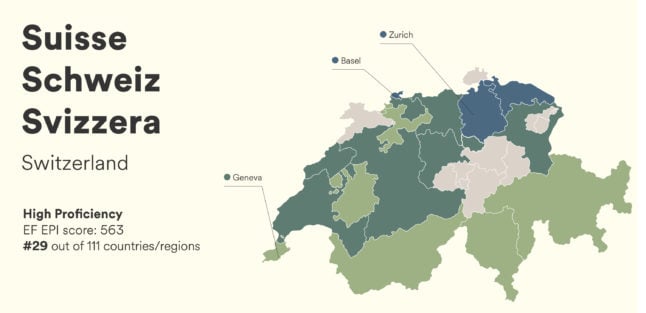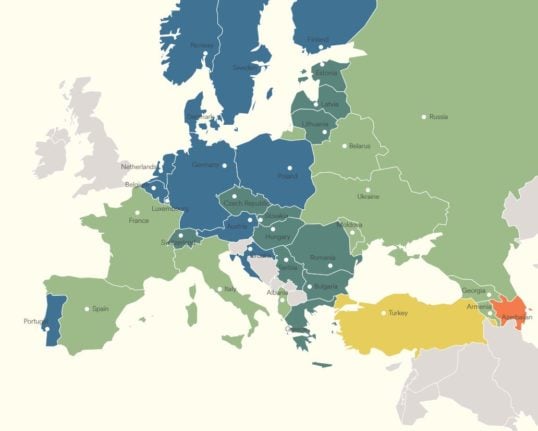Which parts of Switzerland are best at speaking English?

Switzerland has dropped in an international ranking for English proficiency compared to last year. We break down the latest results, and explore where in the country has a better grasp on the English language.
The Swiss have a "high proficiency" in English, ranking 29th in the world and 23rd in Europe out of 35, according to the new 2022 EF English Proficiency Index.
But the study found that English proficiency has slipped in recent years. The Alpine country ranked 25th in the 2021 and took the 18th spot the year before.
The only central and western European countries behind Switzerland were Italy, Spain and France - three places that have long languished in the lower rankings in Europe.
The ranking is based on test results of more than two million adults in 111 countries and regions. Switzerland scored 563 points out of a total of 700 possible points in the index. The Netherlands took the top spot with 661 points.
The global average score was 502, according to the index.
What are the regional differences in Switzerland?
There are big differences across Switzerland when it comes to English proficiency, the ranking shows.
The study looked into regional differences, and found that German-speaking regions had a higher score. The EPI score for German speaking regions was 585 out of a possible 700.
Meanwhile, for French-speaking areas the score was 556, and for Italian-speaking regions the English proficiency score was 543.
When it comes to cities, German-speaking Zurich - a popular destination for foreigners - scored 622 out of 700 on the English proficiency scale, while French-language Geneva scored 555.
Although the index didn't look into all areas, the ranking for some regions and cities is shown below.

Screenshot: EF English Proficiency Index. Dark blue denotes a "very high" English proficiency level, dark green a "high" level and light green a "moderate" level.

Screenshot: EF English Proficiency Index
Why are there such big differences?
It's worth nothing that Switzerland has four official languages. Around 62.1 percent of residents speak Swiss-German, 22.8 percent are French-speakers, 8 percent speak Italian, and 0.5 percent speak Romansh.
English is not an official language, It is, however, the most commonly spoken non-national language in Switzerland, and it's regularly used by about 45 percent of the population in Switzerland.
READ ALSO: Just how good are the Swiss at speaking different languages?
So why is English more prevalent in German parts of the country?
That could reflect the different cultures on speaking English among European countries.
German-speaking Austria, for instance, took the second spot in the global ranking with 628 points out of 700. Germany snagged the number 10 position.
Meanwhile, Italy was placed in the 32nd position in the ranking, Spain was number 33, and France came in at 34. These three countries are described as having "moderate proficiency" in English speaking in the index.
According to our sister site, The Local France, there are several theories on why English is less widely spoken there. One expert has said it's because there's a lack of exposure to English in France, while others have criticised the quality of English teaching in schools.
READ MORE:
- Worse in the EU? Just how well (or badly) do the French speak English?
- Why Italians have a hard time learning English
So the cultural relationship with speaking English may influence those who speak that language in Switzerland.
However, it also depends on other factors such as where people live and the demographics. Unsurprisingly, residents in Swiss cities are more likely to speak English than people in rural settings, for instance. The number of foreigners in the region also contributes to how exposed people are to English.
Younger people in Switzerland are also more likely to speak English.

A colour-coded map of Europe on English proficiency. Dark blue denotes a "very high" level, dark green a "high" level and light green a "moderate" level. Credit: EF EPI 2022
What else do we know about English language learning in Switzerland?
Switzerland reserves 15.53 percent of total government expenditure on education, a figure above the Netherlands (12.91 percent) but just behind Norway, which ranked fourth in the global ranking and sets out almost 16 percent of government expenditure on education.
READ MORE: MAP: Where do Switzerland’s English-speakers live?
Comments
See Also
The Swiss have a "high proficiency" in English, ranking 29th in the world and 23rd in Europe out of 35, according to the new 2022 EF English Proficiency Index.
But the study found that English proficiency has slipped in recent years. The Alpine country ranked 25th in the 2021 and took the 18th spot the year before.
The only central and western European countries behind Switzerland were Italy, Spain and France - three places that have long languished in the lower rankings in Europe.
The ranking is based on test results of more than two million adults in 111 countries and regions. Switzerland scored 563 points out of a total of 700 possible points in the index. The Netherlands took the top spot with 661 points.
The global average score was 502, according to the index.
What are the regional differences in Switzerland?
There are big differences across Switzerland when it comes to English proficiency, the ranking shows.
The study looked into regional differences, and found that German-speaking regions had a higher score. The EPI score for German speaking regions was 585 out of a possible 700.
Meanwhile, for French-speaking areas the score was 556, and for Italian-speaking regions the English proficiency score was 543.
When it comes to cities, German-speaking Zurich - a popular destination for foreigners - scored 622 out of 700 on the English proficiency scale, while French-language Geneva scored 555.
Although the index didn't look into all areas, the ranking for some regions and cities is shown below.


Why are there such big differences?
It's worth nothing that Switzerland has four official languages. Around 62.1 percent of residents speak Swiss-German, 22.8 percent are French-speakers, 8 percent speak Italian, and 0.5 percent speak Romansh.
English is not an official language, It is, however, the most commonly spoken non-national language in Switzerland, and it's regularly used by about 45 percent of the population in Switzerland.
READ ALSO: Just how good are the Swiss at speaking different languages?
So why is English more prevalent in German parts of the country?
That could reflect the different cultures on speaking English among European countries.
German-speaking Austria, for instance, took the second spot in the global ranking with 628 points out of 700. Germany snagged the number 10 position.
Meanwhile, Italy was placed in the 32nd position in the ranking, Spain was number 33, and France came in at 34. These three countries are described as having "moderate proficiency" in English speaking in the index.
According to our sister site, The Local France, there are several theories on why English is less widely spoken there. One expert has said it's because there's a lack of exposure to English in France, while others have criticised the quality of English teaching in schools.
READ MORE:
- Worse in the EU? Just how well (or badly) do the French speak English?
- Why Italians have a hard time learning English
So the cultural relationship with speaking English may influence those who speak that language in Switzerland.
However, it also depends on other factors such as where people live and the demographics. Unsurprisingly, residents in Swiss cities are more likely to speak English than people in rural settings, for instance. The number of foreigners in the region also contributes to how exposed people are to English.
Younger people in Switzerland are also more likely to speak English.

What else do we know about English language learning in Switzerland?
Switzerland reserves 15.53 percent of total government expenditure on education, a figure above the Netherlands (12.91 percent) but just behind Norway, which ranked fourth in the global ranking and sets out almost 16 percent of government expenditure on education.
READ MORE: MAP: Where do Switzerland’s English-speakers live?
Join the conversation in our comments section below. Share your own views and experience and if you have a question or suggestion for our journalists then email us at [email protected].
Please keep comments civil, constructive and on topic – and make sure to read our terms of use before getting involved.
Please log in here to leave a comment.